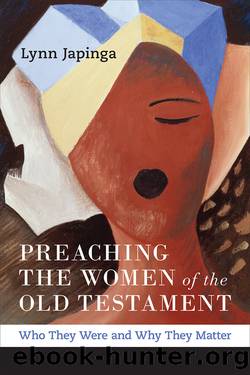Preaching the Women of the Old Testament by Lynn Japinga

Author:Lynn Japinga
Language: eng
Format: epub
ISBN: 9781611647891
Publisher: Westminster John Knox Press
Chapter Twenty-Eight
Rizpah
Rizpah was a concubine to King Saul. She is mentioned briefly in 2 Samuel 3:6â11 and has a slightly larger role in 2 Samuel 21:1â14. Her story is not in the lectionary.
Rizpah does not speak. She has no words. She is a political pawn without power, status, or significance, but she faced a devastating loss with such courage that even King David took notice.
Rizpah appears briefly in two stories. In 2 Samuel 3:6â11, she is introduced as King Saulâs concubine and the mother of two of his sons. When Saul died, the kingdom of Israel was divided. Saulâs older son Ishbaal became king over the northern part of Israel, and David became king over the southern part. Ishbaal had been appointed as king by Abner, his powerful general, but Ishbaal no longer trusted Abnerâs loyalty. Ishbaal accused Abner of sleeping with Rizpah,1 a sign Abner was trying to get the throne for himself. Abner resented the accusation and retorted that he was a loyal aide, but the text does not say whether he was indignant about being caught or being falsely accused. Abner implied that Ishbaal was a weak and ineffective king, and that Davidâs star was rising while Ishbaalâs was falling. Abner wanted to support the king with the best chance to succeed. The text reported that Ishbaal was silent, which was further evidence of his weakness. The king was cowering before his general.
While the men fought over the woman, the woman was silent. After the death of Saul, Rizpah may have felt vulnerable and alone, and hoped a relationship with Abner would protect her. It is equally possible that she had no choice. If a powerful man wanted to âtakeâ her to make a political point, she could not say no. Abner may have cared about her, but it is more likely that he wanted to possess her because she had belonged to Saul.
The text does not say whether there was a sexual relationship between Abner and Rizpah, or whether it existed only in the paranoid mind of Ishbaal. Did Ishbaal want Rizpah for himself, to prove his own fitness to reign? Or did he not want Abner to have her? Ishbaalâs concern might have been admirable if he was trying to protect Rizpah from unwanted sexual advances, but he simply wanted to limit Abnerâs access to power. Neither man genuinely cared for her well-being. She was a pawn between two men flaunting their sexual and political power.
Her lack of agency did not stop Abraham Kuyper from labeling her as a flawed, sinful woman who âillegitimately yielded to Abnerâs desire.â Her action âprovokes disgust and betrays feminine weakness.â2 He blamed the woman for the sins of the men. Kuyper did not see that Rizpah lacked the power to say no to Abner.
The story did not end well for Rizpah. Abner was killed by one of Davidâs men, so if he and Rizpah did have a relationship, she had lost another person who offered her some security.
Rizpah next appears in 2 Samuel 21:1â14.
Download
This site does not store any files on its server. We only index and link to content provided by other sites. Please contact the content providers to delete copyright contents if any and email us, we'll remove relevant links or contents immediately.
| Adult Ministry | Children's Ministry |
| Counseling & Recovery | Discipleship |
| Evangelism | Missions & Missionary Work |
| Preaching | Sermons |
| Youth Ministry |
Victory over the Darkness by Neil T. Anderson(2868)
The Rape Of Nanking by Iris Chang(2824)
Chosen by God by R. C. Sproul(2165)
Habits of Grace by David Mathis(1984)
Crash the Chatterbox by Steven Furtick(1978)
Knowing God by J.I. Packer(1860)
How To Be Born Again by Billy Graham(1782)
A Prophet with Honor by William C. Martin(1727)
Gospel-Shaped Marriage by Chad van Dixhoorn(1719)
Peace with God by Billy Graham(1691)
Confronting Christianity by Rebecca McLaughlin(1593)
God's Smuggler by Brother Andrew(1549)
Angel Dreams by Virtue Doreen Virtue Melissa(1483)
Whisper by Mark Batterson(1458)
The School of Biblical Evangelism by Ray Comfort(1438)
Missionaries by Norman Lewis(1430)
The Truth War by John MacArthur(1426)
The Poems of Rowan Williams by Rowan Williams(1358)
Do Greater Things by Robby Dawkins(1329)
